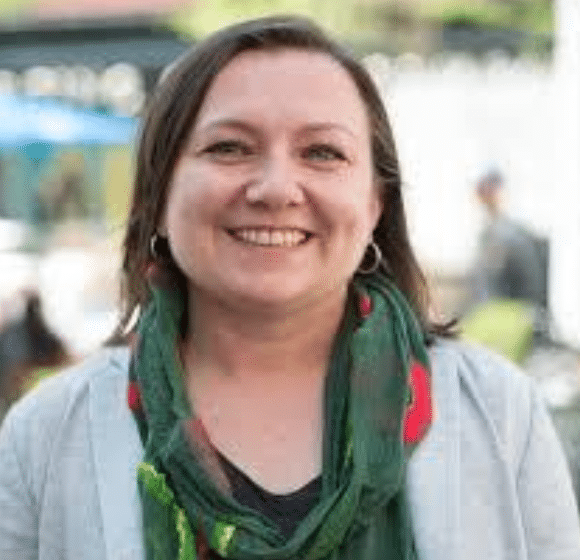Have you ever wondered about the many hidden trips that underpin the care work holding our daily lives together? Inés Sánchez de Madariaga coined the concept mobility of care, shining light on the daily travel patterns and mobility needs that go along with reproductive labor.
Aimée Guthier from ITDP works on the mobility of care and shares her thoughts on acknowledging and prioritizing care trips. During the ITF in Leipzig, we interviewed her for our Talking Transport Transformation podcast. She is the Chief Knowledge Officer at the Institute for Transportation and Development Policy (ITDP) and works on the mobility of care as well as related gender disparities in transportation. Learn how to create a more compassionate and equitable transport system for inclusive communities!
“Our transportation systems reflect our values”
“Mobility is not only related to trips to work. Our lives are so much bigger than our jobs”, Aimée Gauthier says. She sheds light on the pressing need to incorporate care mobility into transport planning to elevate the significance of the often unvalued, unrecognized, and invisible care work. “The mobility of care means the need to complement our economic productivity with social reproductive work like going to school, to health clinics, to grocery stores, to the pharmacy, maintaining the household, and making sure everyone is well and fed and fit”, she explains.
This is about structural change, saying that we value these things. We count on them, and we need to plan for them.
For example, sprawling cities which lead to car dependency can be anti-woman and anti-caregivers, explains Aimée, since most families use their car for the work commute over care work. “Our transportation systems reflect our values. And right now, we are appearing to be an uncaring society, and that’s not who we should be or want to be.”
“Mobility is so much more than throughput.”
The mobility of care also encompasses aspects of road safety and personal security. Typically, we think about it from a perspective of gender violence[1] or urban violence [2], but there is also violence in transport. “It could be you”, says Aimée, pointing out that most women have experienced harassment or unsafe situations when moving around the city. However, this invisible kind of violence is often neglected in transport planning. Aimée suggests thinking of public transport systems that don’t carry an inherent threat of gender violence. According to her, a good start could be to work with the parents of school children to change perceptions about safety and security for children of all genders.
Aimée also stresses the importance of resting areas when designing cities for the mobility of care. “Part of walking needs to be sitting”, she explains, calling for places to pause, sit, and interact, for shaded walkways, and for time outside spent with family. “Mobility is so much more than throughput – moving together with people is not something we are planning for”. Aimée makes a passionate plea for valuing care work in transportation, which is fundamental to our basic human rights:
“Transportation needs to be considered a basic right, because without it, you can’t do all the things that you’re supposed to be doing as a human. For the just transition, we have to really remove the systemic barriers and have equity measures in place.”
In a world where mobility transcends the daily commute, Aimée Gauthier’s words are a guiding force for a transformative and inclusive transport future.
Listen to the episode on Podigee
[1] Gender-based violence is violence directed against a person because of that person’s gender or violence that affects persons of a particular gender disproportionately. (European Commission)
[2] There is no official definition for urban violence, but most often, the term refers to “violence nested in socio-political, legal and economical structures as well as physical infrastructures” (Simone Tulumello).



